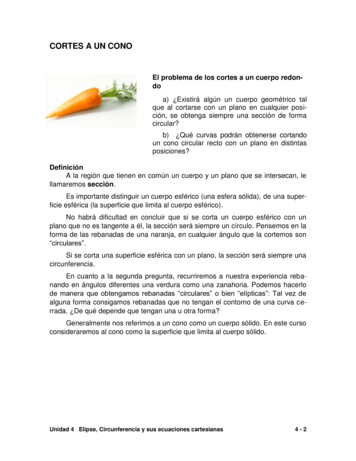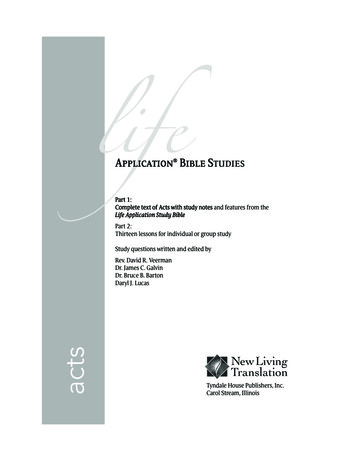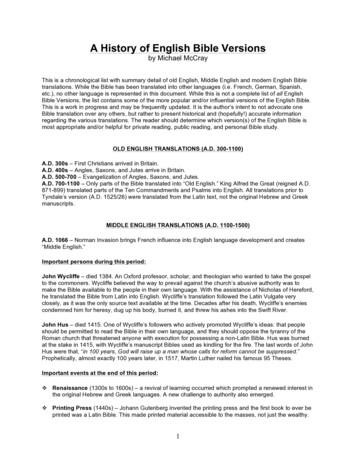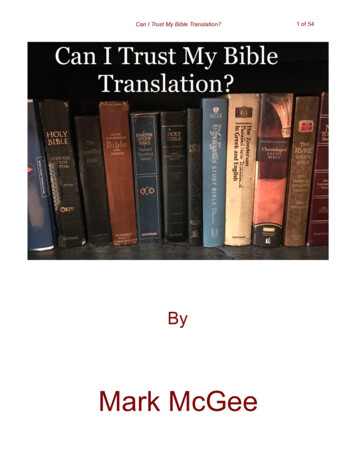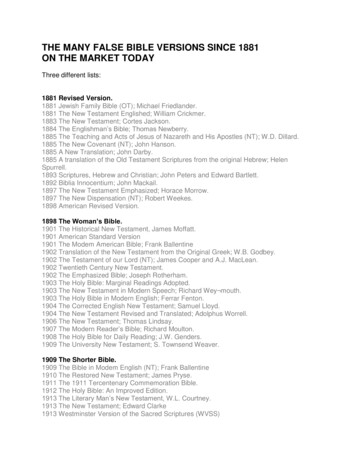
Transcription
Notes onActs2 0 2 2 E d i t i o nDr. Thomas L. ConstableTITLEThe title "The Acts of the Apostles" is very ancient.1 The Anti-MarcionitePrologue to the Gospel of Luke (A.D. 150-180) contains the oldestreference to the book by this name. The title is a bit misleading, however,because the book contains only a few of the acts of some of the apostles,primarily Peter and Paul. The book is more a story of the extension of thechurch from Jerusalem to Rome than it is a complete history of theapostles' acts. Whereas Jesus is the chief character in the Gospels, theHoly Spirit working through the apostles is the chief character in Acts.WRITERTwo lines of argument lead to the conclusion that Luke, who was the friend,fellow missionary, and physician of the Apostle Paul wrote this book, underthe inspiration of the Holy Spirit: First, there is the internal evidence,specifically the passages written in the first person plural that can refer toLuke (16:10-40; 20:5—21:18; 27:1—28:16). Second, we have externalevidence indicating that Luke wrote Acts. This evidence includes referencesby early church fathers,2 comments in collections of New Testamentbooks,3 and editorial statements in early notes on certain New Testamentbooks.4 Luke's name does not appear in Acts, but it is a shortened Greekform of a Latin name: either Lucanus, Lucianus, Lucius, or Lucillus. Eusebius1Quotationsfrom the English Bible in these notes are from the New American StandardBible (NASB), 2020 edition, unless otherwise indicated.2E.g., Irenaeus, c. 180 A.D.3E.g., the Muratorian Canon, second century A.D. See Documents of the Christian Church,pp. 28-29, for an English translation of the text.4E.g., the Anti-Marcionite Prologue to the Gospel of Luke, second century A.D. See T. W.Manson, Studies in the Gospels and Epistles, p. 49, for an English translation.Copyright Ó 2022 by Thomas L. Constable
Dr. Constable's Notes on Acts22022 Editionand Jerome wrote that Luke was a native of Syrian Antioch.1 There is alsosome tradition that he was from Philippi.2DATE AND PLACE OF COMPOSITIONThe date of composition was probably in the early sixties: A.D. 60-63. Inview of his emphases, Luke probably would have mentioned severalimportant events had they occurred by the time he wrote. These includethe Neronian persecution of Christians that began in A.D. 64, Paul's deathin A.D. 68, and the destruction of Jerusalem in A.D. 70.We do not know for sure where Luke was when he wrote Acts. Perhaps hecomposed it over a period of years, drawing on various sources, and thenput it into its final form in Rome where Paul was in confinement for twoyears (28:30-31; A.D. 60-62)."Fortunately the intelligibility and value of the book are largelyindependent of a knowledge of the precise situation in whichit was written. While the finer points of the interpretation ofActs can still cause intense discussion among scholars, theessential themes of the book are basically clear and simple."3SCOPEThe events recorded in Acts cover a period of about 30 years: beginningwith the Lord Jesus' ascension in A.D. 33, and extending to Paul's two-yearRoman house arrest that ended about A.D. 62.4 The Delphic Inscription andseveral references in Josephus, plus one in Suetonius, enable us to identifykey dates in Acts.51J.S. Howson, in The Life and Epistles of St. Paul, p. 241.T. Robertson, Word Pictures in the New Testament, 2:x.3I. Howard Marshall, The Acts of the Apostles, p. 49.4See Appendix 1 at the end of these notes for a table of Paul's activities.5See Darrell L. Bock, Acts, p. 30, for a chart of these.2A.
2022 EditionDr. Constable's Notes on Acts3GENREMost scholars believe that Acts fits within the literary classification ofancient history. The Greek word praxeis, "acts," identifies a specific genre(type of literature) or subgenre in the ancient world: narratives of theheroic deeds of individuals or cities. However, it was not the name of atechnical genre as such.1 Acts bears all the marks of a book of ancienthistory. Luke was on a par with other writers of ancient history in his daywith regard to his skill and methodology.2 However, Acts is more than justa book of history, as the following section explains.3PURPOSEThere seems to have been a three-fold purpose for the writing of Acts. Aswith the other books of the Bible that record history in narrative (story)form, certainly Luke had a historical purpose.4 He intended to provide aninspired record of selected events that show the spread of the gospel andthe church. They branched out from Jerusalem, the center of Judaismwhere the church began, to Rome."This book may be called an account of the beginning of thebringing of God's supply to humanity to meet its need."5"Streeter suggested that an alternative title for the book ofActs might be 'The Road to Rome', for this is indeed thesignificance of Luke's work. Whatever minor motifs Luke hadin mind, such as the establishment of Christianity in men'sminds as a constructive and not destructive element in thesocial order, his main concern was to show that, in God's planfor the renewal of the life of mankind, Jerusalem, the heart ofold Israel, was the goal of Stage I [i.e., the Book of Luke], while1DonaldA. Carson and Douglas J. Moo, An Introduction to the New Testament, pp. 285,300-01.2Ibid., pp. 316-21.3See also Gordon Fee, "The Genre of New Testament Literature and BiblicalHermeneutics," in Interpreting the Word of God, pp. 114-19.4William Barclay, The Acts of the Apostles, p. xvii.5G. Campbell Morgan, The Unfolding Message of the Bible, p. 334.
Dr. Constable's Notes on Acts42022 EditionRome, the centre of the world, was the goal of Stage II [i.e.,the Book of Acts]."1However, the fact that Luke included what he did, and omitted much otherhistorical data, indicates a second, theological purpose. He showed how theplans and purposes of God were working out through history. In particular,he showed how Jesus Christ was faithfully and irresistibly building Hischurch (Matt. 16:18).2 This involved clarifying how God's dealings withhumankind had taken a different course because of the Jews' rejection oftheir Messiah.3" Luke in Acts is not merely concerned to draw a linkbetween the time of Jesus and the time of the early church,as is commonly noticed, but also between the time of Israeland the time of Jesus and His church. Acts insists that the Godwho was at work in the history of his ancient people, Israel,bringing them salvation, is the same God who is at work in thechurch."4Third, Luke evidently had an apologetic purpose in writing. He frequentlypointed out the relationship of the church to the Roman state by referringto many Roman officials, not one of whom opposed Christianity because ofits doctrines or practices. This would have made Acts a powerful defensivetool for the early Christians in their struggle to survive in a hostile paganenvironment.Richard Longenecker identified Luke's purposes as kerygmatic(proclamation), apologetic (defensive), conciliatory (peacemaking), andcatechetical (instructive).5"I propose that forging a vision for what life could be like in thegathered church, while certainly not his only priority and1WilliamNeil, The Acts of the Apostles, p. 27.Stephen J. Strauss, "The Purpose of Acts and the Mission of God," Bibliotheca Sacra169:676 (October-December 2012):443-64.3For a very good discussion of the major theological emphases in Acts, see Marshall, pp.23-34.4Brian S. Rosner, "Acts and Biblical History," in The Book of Acts in Its First CenturySetting; Vol. 1: The Book of Acts in Its Ancient Literary Setting, p. 82. Cf. George E. Ladd,"The Acts of the Apostles," in The Wycliffe Bible Commentary, pp. 1123-24.5Richard N. Longenecker, "Acts," in John-Acts, vol. 9 of The Expositor's BibleCommentary, pp. 216-21.2See
2022 EditionDr. Constable's Notes on Acts5perhaps not his highest, was clearly one of Luke's majorconcerns in writing Acts. I believe Luke deliberately chosepositive aspects of church life for inclusion in the summarynarratives [2:42-47; 4:32-35; and 5:12-16]. He did this inorder to present his portraits of church life as a positiveexample for readers to study and emulate in their ownchurches. For Luke, the summary narratives describe what lifecould be like in an exemplary church."1"We agree with a growing number of scholars who think thatLuke wrote with a variety of specific purposes and that thesepurposes are part of a larger, general purpose—the edificationof Christians."2UNIQUE FEATURESActs is the only New Testament book that continues the history begun inthe Gospels. Whereas Luke's Gospel focuses on the vertical universalizationof the gospel (up and down the social scale), Acts focuses on its horizontaluniversalization (from Jerusalem to the uttermost parts of the world)." the Acts is to be seen in close literary association with theGospel [of Luke]. They form two parts of one work, conceivedin its final form as a unity, whether or not the originalcomposition of the Gospel took place independently of the planto produce the two-part work. Although there are otherexamples of literary compositions in two parts (Josephus,Contra Apionem, is one of the nearest parallels to Luke-Actsin time and cultural context), Luke's work appears to be uniqueamong Christian writings and to have no close secularprecedents in its combination of the stories of a religiousleader and of his followers."3"The book which we call the Acts of the Apostles may be saidto complete the Pentateuch of New Testament history. Four1AndyChambers, Exemplary Life, p. 5.and Moo, p. 305.3I. Howard Marshall, "Acts and the 'Former Treatis,'" in The Book of Acts in Its FirstCentury Setting; Vol. 1: The Book of Acts in Its Ancient Literary Setting, p. 182.2Carson
Dr. Constable's Notes on Acts62022 Editionof these books present the Person of our Lord; while the fifthgives the first page of the history of the Church "1"This book is to the Gospels what the fruit is to the tree thatbears it. In the Gospels we see the corn of wheat falling intothe ground and dying: in the Acts we see it bearing forth muchfruit (John 12:24)."2Acts is also an indispensable historical record for understanding the ApostlePaul's epistles; without it we could not understand some of the things thathe wrote. It is the only Bible book that records the historical transition fromJudaism to Christianity. It provides basic information about and insight intothe early church. And it challenges every modern Christian.3Longenecker has shown that Luke's method of writing history was in linewith current historiography (the writing of history) of his day.4 BenWitherington observed that Luke-Acts is more typical of ancient Greekhistory writing than Roman (Latin).5 Others have argued that it is more likethe Hebrew Scriptures than anything else. Arno Gaebelein pointed outsimilarities between the Gospels and Genesis, Acts and Exodus, the Paulineepistles and Leviticus, the General epistles and Numbers, and Revelationand Deuteronomy.6The Gospel of Luke is the longest book in the New Testament with 1,151verses, Matthew is the second longest with 1,071 verses, and Acts is thethird longest with 1,003 verses.1G.Campbell Morgan, The Acts of the Apostles, p. 9.Jamieson, A. R. Fausset, and David Brown, Commentary Practical and Explanatoryon the Whole Bible, p. 1080.3Stanley D. Toussaint, "Acts," in The Bible Knowledge Commentary: New Testament, p.349.4Longenecker, pp. 212-14.5Ben Witherington III, The Acts of the Apostles: A Socio-Rhetorical Commentary, p. 28.6Arno C. Gaebelein, The Annotated Bible, 3:1:251.2Robert
2022 EditionDr. Constable's Notes on Acts7STRUCTURELongenecker identified five phenomena about the structure of Acts thatthe reader needs to recognize in order to appreciate what Luke sought tocommunicate in Acts:1W."1.It begins, like the [Third] Gospel, with an introductorysection of distinctly Lukan cast dealing with theconstitutive events of the Christian mission (1:1—2:41)before it sets forth the advances of the gospel 'inJerusalem, and in all Judea and Samaria, and to the endsof the earth' (1:7)."2.This introductory section is followed by what appears tobe a thematic statement (2:42-47). This material, whileoften viewed as a summary of what precedes, mostprobably serves as the thesis paragraph for whatfollows."3.In his presentation of the advance of the Christianmission, Luke follows an essentially geographical outlinethat moves from Jerusalem (2:42—6:7), through Judeaand Samaria (6:8—9:31), on into Palestine-Syria(9:32—12:24), then to the Gentiles in the eastern partof the Roman Empire (12:25—19:20), and finallyculminates in Paul's defenses and the entrance of thegospel into Rome (19:21—28:31)."4.In his presentation, Luke deliberately sets up a numberof parallels between the ministry of Peter in the first halfof Acts and that of Paul in the last half.1"5.Luke includes six summary statements or 'progressreports' (6:7; 9:31; 12:24; 16:5; 19:20; and 28:31),H. Griffith Thomas, The Acts of the Apostles: Outline Studies in Primitive Christianity,pp. 25-26, offered some helpful comparisons between Peter's ministry and Paul's in Acts.For two lists of 16 parallels between Acts 1—12 and 13—28, see Charles H. Talbert,Literary Patterns, Theological Themes, and the Genre of Luke-Acts, pp. 23-24. This bookcontains many tables of interesting parallels within Acts, within Luke, and between Lukeand Acts.
8Dr. Constable's Notes on Acts2022 Editioneach of which seems to conclude its own 'panel' ofmaterial.1"Taking all these literary and structural features into account,we may conclude that Luke developed his material in Actsalong the following lines:"Introduction: The Constitutive Events of the Christian Mission(1:1—2:41)"Part I: The Christian Mission to the Jewish World (2:42—12:24)Panel 1—The Earliest Days of the Church at Jerusalem(2:42—6:7)Summary Statement: 'So the word of God spread. Thenumber of disciples in Jerusalem increased rapidly,and a large number of priests became obedient tothe faith' (6:7).Panel 2—Critical Events in the Lives of Three Pivotal Figures(6:8—9:31)Summary Statement: 'Then the church throughoutJudea, Galilee and Samaria enjoyed a time ofpeace. It was strengthened; and encouraged bythe Holy Spirit, it grew in numbers, living in thefear of the Lord' (9:31)Panel 3—Advances of the Gospel in Palestine-Syria (9:32—12:24)Summary Statement: 'But the word of God continued toincrease and spread' (12:24)"Part II: The Christian Mission to the Gentile World (12:25—28:31)1Cf.A Dictionary of the Bible, s.v. "The Chronology of the New Testament," by C. H.Turner, 1:421. Turner's first panel included 1:1—2:41.
Dr. Constable's Notes on Acts2022 Edition9Panel 4—The First Missionary Journey and the JerusalemCouncil (12:25—16:5)SummaryStatement:'So the churches werestrengthened in the faith and grew daily innumbers' (16:5).Panel 5—Wide Outreach Through Two Missionary Journeys(16:6—19:20)Summary Statement: 'In this way the word of the Lordspread widely and grew in power' (19:20).Panel 6—To Jerusalem and Thence to Rome (19:21—28:31)Summary Statement: 'Boldly and without hindrance hepreached the kingdom of God and taught aboutthe Lord Jesus Christ' (28:31)."1THEOLOGYDarrell Bock has identified the key subjects in Acts as God, Jesus, and theHoly Spirit. More particularly, he noted the following theological emphases:the plan and work of the mighty God; mission, opposition, and the inclusionof the Gentiles; Jesus, the Lord of all for a gospel sent to all; the newcommunity's emerging separate identity; the law; the triumph of thegospel; and eschatology (end times events).2OUTLINEI.The witness in Jerusalem 1:1—6:7A.1Longenecker,The founding of the church 1:1—2:47pp. 233-34. For further study of background issues such as the history,authorship, unity, text, composition, theology, church, and ministry of the Book of Acts,see the Introduction in Richard B. Rackham, The Acts of the Apostles, pp. xiii-cxv.2Bock, pp. 32-42.
Dr. Constable's Notes on Acts101.2.3.4.5.6.B.External opposition 3:1—4:31Internal compromise 4:32—5:11Intensified external opposition 5:12-42Internal conflict 6:1-7The witness in Judea and Samaria 6:8—9:31A.The martyrdom of Stephen 6:8—8:1a1.2.3.B.C.Stephen's arrest 6:8—7:1Stephen's address 7:2-53Stephen's death 7:54—8:1aThe ministry of Philip 8:1b-401.2.The evangelization of Samaria 8:1b-25Philip's ministry to the Ethiopian eunuch 8:26-40The mission of Saul 9:1-311.2.3.III.The resumptive preface to the book 1:1-5The command to witness 1:6-8The ascension of Jesus 1:9-11Jesus' appointment of a twelfth apostle 1:12-26The birth of the church 2:1-41The early state of the church 2:42-47The expansion of the church in Jerusalem 3:1—6:71.2.3.4.II.2022 EditionSaul's conversion and calling 9:1-19aSaul's initial conflicts 9:19b-30The church at peace 9:31The witness to the uttermost part of the earth 9:32—28:31A.The extension of the church to Syrian Antioch 9:32—12:241.2.3.4.Peter's ministry in Lydda and Joppa 9:32-43The conversion of Cornelius 10:1—11:18The initiatives of the Antioch church 11:19-30The persecution of the Jerusalem church 12:1-24
2022 EditionB.2.3.4.5.6.The divine appointment of Barnabas and Saul 12:25—13:3The mission to Cyprus 13:4-12The mission to Asia Minor 13:13—14:21aPaul and Barnabas' return to Antioch of Syria 14:21b-28The Jerusalem Council 15:1-35The strengthening of the Gentile churches 15:36—16:5The extension of the church to the Aegean shores 16:6—19:201.2.3.4.5.D.11The extension of the church to Cyprus and Asia Minor 12:25—16:51.C.Dr. Constable's Notes on ActsTheTheTheTheThecall to Macedonia 16:6-10ministry in Macedonia 16:11—17:15ministry in Achaia 17:16—18:17beginning of ministry in Asia 18:18-22results of ministry in Asia 18:23—19:20The extension of the church to Rome istryMinistryon the way to Jerusalem 19:21—21:16in Jerusalem 21:17—23:32in Caesarea 23:33—26:32on the way to Rome 27:1—28:15in Rome 28:16-31MESSAGEThe message of Acts is that the church of Jesus Christ is God's instrumentto glorify Himself in the present age. The subject of the Book of Acts, whatis its primary focus of attention, is the church of Jesus Christ.Acts contains three major revelations regarding the church:The first of these concerns is the origin of the church. Jesus Christ createdthe church.During His earthly ministry, Jesus Christ prepared for the creation of thechurch. He instructed His disciples with truth that they did not fully
12Dr. Constable's Notes on Acts2022 Editionunderstand at the time, and He demonstrated for them life that they didnot fully appreciate at the time (John 14:6). We have this record in theGospels.After His ascension, Christ poured out His Holy Spirit on the day ofPentecost. This was the birthday of the church. The baptism of the Spiritdid something that God had never done before in history: It united believerswith Christ in a new relationship as fellow members of the spiritual body ofChrist Jesus had predicted this in John 14:17: "He [the Holy Spirit] remainswith you and will be in you." Believers then shared the life of Christ in a waynever before experienced. God united them with Him. The same Spirit ofGod that indwelt Him now indwells us believers today. The unity of thechurch is not external: what we believe (creeds), how we organize ourselves(polity), or where and how we meet (culture). It is internal: as a result ofHim who indwells us. The basis of our unity in the church goes back to theorigin of the church. It began when the Holy Spirit first baptized believerson the day of Pentecost (1 Cor. 12:13; Rom. 8:9). The "church" is not justa new name for Israel. It is a new entity.The second major revelation of the church that we receive in Acts concernsthe nature of the church. The church is one with Jesus Christ. That is itsnature. It shares one life with its risen Lord.In Luke's Gospel, Luke presented Jesus Christ as the Head of a new race.As Adam was the head of one race, Christ is the last Adam, the Head of anew race. As Adam was the first man, Christ is the second man, the Headof a new race. As the first-born from the dead, Christ is the Head of a newrace.In Acts, we see the new race springing from the Firstborn from the Dead(Jesus Christ). We see the brotherhood of which Christ is the Elder Brother.We see the body growing of which Christ is the Head. The spiritual bondsthat unite the members of Christ's race are stronger than the physicalbonds that unite the members of Adam's race (cf. Matt. 12:47-50). Themembers of the new race are often feeble, faulty, and foolish, but theypossess the life of Christ. Christ is manifesting His life through those whohave become partakers of His life. The nature of the church is that it is oneorganic whole (one body) empowered by the life of Christ. The Holy Spirithas joined us organically to Christ. Whenever Christians partake of theLord's Supper, we should remember that just as the bread and the fruit of
2022 EditionDr. Constable's Notes on Acts13the vine become part of the participant's physical body, so Christ hasbecome part of us spiritually.The third major revelation of the church that Acts gives us concerns thefunction of the church. The function of the church is to be the instrumentof Jesus Christ, His hands and feet and mouth, to carry out His will in theworld. What is the will of Christ? There are three things that Actsemphasizes:The will of God is the imparting of life where there is death. Jesus Christministers divine life through His human instruments. We see Peter, Paul,and all God's other servants in Acts doing the same kinds of things thatJesus did when He walked this earth. They even did the same types ofmiracles. Christ, by His Spirit, was working through them (cf. 1:1-2).References to their being filled with the Spirit reflect Christ's control ofthese people as His instruments. He wants to impart life through believerstoday too, and He does so as we herald the gospel.The will of God is also the manifesting of light where there is darkness. Thelight of the gospel shines through Spirit-filled believers, effectively bringingthe lost into the light of God's presence. In Acts we see Christ, through theHoly Spirit, choosing the persons to whom the gospel would go. We seeHim indicating the places where the gospel would reach. We see Himinitiating the procedures by which the gospel would penetrate the darknesscaused by sin and Satan. This is what Christ wants to do today too. Hewants to manifest light through believers. Spiritual ignorance is taking overin the post-modern world. Our world needs to see light through Christians.Third, the will of God is the producing of love where there is apathy,bitterness, and hatred. Christ's love reaches through believers, who are Hisinstruments, by the Holy Spirit. It produces in the believer love for the Lord,love for Christian brothers and sisters, and love for the world. We see thisillustrated in Acts. This is what Christ wants to do through Christians:produce love.In summary, there are three great revelations of the church in Acts: As toits origin, Jesus Christ created it (Matt. 16:18). As to its nature, the churchis one with Christ (1 Cor. 12:13). As to its function, the church is theinstrument of Christ. Second Corinthians 6:1 says that we are "workingtogether" with God. It is a tremendous privilege to be Christ's members.
14Dr. Constable's Notes on Acts2022 EditionActs also warns us of three major antagonists facing the church:The first of these is prejudice. Prejudice means prejudging, judging on thebasis of limited information. The outstanding example of this type ofopposition in Acts is seen in some of the unbelieving Jews. They refusedto accept the witness of the Christians. They would not tolerate theevidence that the believers presented. They became the major enemies ofthe church—as well as missing the blessings that could have been theirs ifthey had acknowledged their Messiah. The church faces the sameopposition today (e.g., traditional concepts as opposed to Scripturalrevelation). Many Christians are simply playing church. The commitment ofmany Christians to non-biblical traditions, as though they were biblical, isfrightening.The root cause of this problem is lack of confidence in the Holy Spirit.Prejudice says: I do not trust what the Holy Spirit has said in Scripture. Wemust always interpret experience in the light of revelation, not the otherway around. Many Christians feel safer with tradition. Many Christianssimply want to be told what to believe and do. They do not want to thinkfor themselves, or even read the Bible for themselves.The second antagonist the church faces that Acts identifies is personalagendas. By this I mean the desire for something other than the will of God.There are several examples of this peril in Acts: Ananias and Sapphirawanted a reputation for spirituality, not just spirituality itself. Simon Maguswanted a supernatural gift for his own personal glory, not just for the gloryof God. Our flesh also tempts us to serve ourselves while we serve God.This is compromising with the will of God.The root cause of this problem seems to me to be lack of yielding to theHoly Spirit. The Spirit does not fill or control such Christians. They aredouble-minded. We need to yield total control to Him (cf. Rom. 6:12-13).A third antagonist the church faces that we also see in Acts is pride. Twomen provide perhaps the outstanding examples of this peril: Felix andAgrippa. Their desire for personal prestige determined their response toGod's will. Many a person's career goals and ego needs have kept him orher from salvation, or limited God's use of him or her as a Christian.The cause of this problem is lack of obedience to the Holy Spirit. When theSpirit through His Word says: Do this, and we refuse, it is because we set
2022 EditionDr. Constable's Notes on Acts15our wills against His. That is pride. We need to humble ourselves under themighty hand of God. In 10:14, Peter said, "By no means, Lord." What acontradiction.These are three major perils to the church corporately, as well as toChristians individually. Luke warned us of them in Acts. They are majorobstacles to Christ's mission of building His church in the world: prejudice,personal agendas, and pride.Acts also presents three major lessons for the church that it should alwayskeep in view:First, the church's passion must be the glory of God. This was the drivingmotive in the lives of Peter, Paul, and the other faithful missionaries andwitnesses that Luke recorded in this book. Their passion was not their ownpersonal safety or their physical comfort, or the opportunity to relieve thesufferings of others, or the desire to create better living conditions in theworld. They subordinated all these worthy ambitions to God's glory in theirhearts. Christians too must commit ourselves to glorifying God aboveeverything else, personally and corporately. The cry of the ProtestantReformers was Sola gloria dei: "Only the glory of God." Jesus taught us topray, "Hallowed be Your name" (Matt. 6:9; Luke 11:2).Second, the church's governing principle must be loyalty to Christ. Again,the leaders of the early church modeled this for us. They put Christ'sinterests before their own, and they were single-minded in their living. Thisis the evidence of their being filled with the Spirit. Their primarycommitment was to letting His life work in and through them, and tocarrying out His work, not their own. How loyal are we Christians to Christindividually and corporately? John the Baptist said, "He must increase, butI must decrease" (John 3:30). We must be single-minded and radical in ourcommitment to please the Lord (cf. 2 Tim. 2:4).Third, the church's power must be the Holy Spirit. The many references toprayer in Acts show us how conscious the early Christians were of theirdependence on God's power. They did not go out in self-confidence, but inGod-confidence. They called on Him to reveal Christ's life in and throughthem (4:24-30). They called on Him to direct Christ's works in and throughthem (12:12; 20:36). We Christians must not only be obedient and yieldedto the Holy Spirit but also dependent on Him, because He is our powerindividually and corporately (John 15:5).
16Dr. Constable's Notes on Acts2022 EditionFinally, three challenges grow out of the emphases of Acts:First, what is your motivation as a Christian? Why do you do what you do?What motivated the Spirit-filled believers in Acts was the desire that Godshould get the glory above everything else. Who do you want to get thecredit for what you do? Former United States President Ronald Reaganreportedly had a sign on his desk in the White House that said, "There isno limit to what you can accomplish, if you don't care who gets the credit."Second, what is your method as a Christian? How do you do what you do?Our models in Acts cooperated with God so Christ could work through themby His Holy Spirit. This involved having confidence in His revelation, yieldingto His will, obeying His Word, and depending on His Holy Spirit.Third, what is your emphasis as a Christian? What do you do? In Acts, theleaders of the church gave priority to what is most important to God, notto what was most important to themselves personally. Furthermore, theyemphasized the essentials, not the incidentals. Let us not get so fascinatedwith the incidentals, such as how God manifested His power (healings,speaking in tongues, etc.), that we fail to give priority to the essentials.One essential is that God is powerful enough to do anything to accomplishHis purposes. Many Christians are very reluctant to believe that God can dowhatever needs to be done. Let us give ourselves to the task before uswholeheartedly and enthusiastically. In Matthew 28:18, Jesus said: "Allauthority in heaven and on earth has been given to Me." In Acts 1:8, Hesaid, "You will receive power when the Holy Spirit
Dr. Thomas L. Constable TITLE The title "Acts of the Apostles" is very ancient. The Anti-Marcionite Prologue to the Gospel of Luke (A.D. 150-180) contains the oldest reference to the book by this name. The title is a bit misleading, however, because the book contains only a fe
